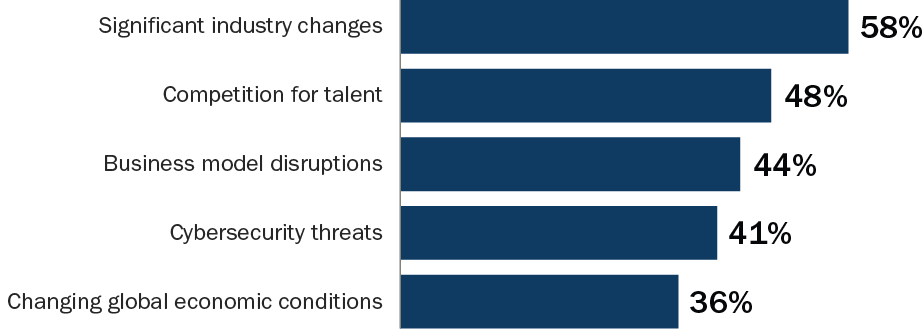
2017–2018
NACD Private Company Governance Survey
The State of Private Company Board Governance
Expectations are rising for private company boards, and the business environment is becoming increasingly complex. Against this backdrop, directors seek to understand whether their boards' governance practices align with those of their peers. The 2017–2018 NACD Private Company Governance Survey offers insight into the priorities, challenges, and composition of private company boards.
Key Findings
Growing Business Disruptions Are Top Private Board Concerns
Boards foresee a number of disruptive and interrelated business trends impacting their organizations over the next year. More than half of boards (58%) identified significant industry changes as a top five trend impacting their organization over the next year. The business environment is changing faster and the impact of these changes seems larger than ever before.What five trends do you foresee having the greatest effect on your company over the next 12 months?

Private Boards Should Assess Culture Beyond Tone at the Top
Private company boards have a limited understanding of the strength of corporate culture below the tone at the top. While 82 percent of directors rate their understanding of tone at the top as high or very high, only 34 percent can say the same about the mood in the middle, and a paltry 21 percent have a strong sense of the buzz at the bottom. This skewed, top-heavy perspective about culture can blind directors to significant cultural problems that are emerging deeper in the organization and increasing the likelihood of all types of risk to the business.How would you rate your board's understanding of the health of the organizational culture at each of the following levels?

Boards Should Look Across the C-Suite for Effective Cyber-Risk Oversight
Cybersecurity continues to be a top concern for nearly every board. To effectively oversee cyber risk, boards should seek broad perspective from representatives across the C-suite. Although reports from the CEO, CIO, or CISO are critical to cyber-risk oversight, relying exclusively on these reports is insufficient for effective oversight. Cyber-risk implications often extend well beyond narrow concerns over technical defenses and detective controls to the quality of the company’s risk culture, supply-chain management, growing regulatory risk, business strategy, personnel processes, new-product development, and company reputation.Which representatives from management report to the board about the state of cybersecurity?

About NACD's Private Company Governance Survey
NACD annually surveys its membership community on key board governance practices and major business trends. We analyze our rich survey data to deliver insights on the state of board governance for public and private companies in a wide range of areas, including board structure, composition, recruitment, diversity, strategy, risk oversight, and shareholder engagement. We also offer custom benchmarking support for members who want to assess how their approach in specific governance areas compares to that of their peers. Click here to learn more about our board benchmarking services.